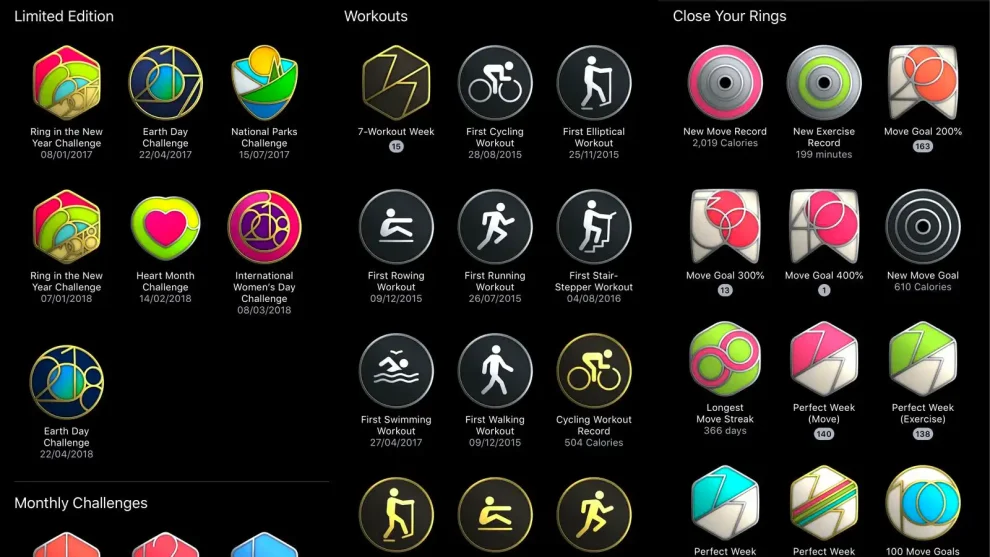A Flurry of Fitness Fun: Unveiling the Badge System
Apple Watch users, lace up your sneakers and get ready to sweat! Today’s the perfect opportunity to snag a unique digital reward – the limited-edition badge. But this isn’t your average participation trophy. These exclusive badges are more than just virtual bragging rights; they represent a subtle yet powerful use of gamification to motivate users and foster a sense of accomplishment. Let’s delve into the world of Apple Watch badges, explore how they work, and uncover the psychology behind their effectiveness.
Since its inception, the Apple Watch has aimed to be more than just a timepiece; it’s a personalized fitness companion. The built-in Workout app tracks various activities, from brisk walks and intense cycling sessions to mindful yoga flows. To incentivize users and celebrate their achievements, Apple introduced a badge system. These digital badges come in two categories: standard badges and limited-edition badges.
- Standard Badges: Awarded for completing specific milestones within the Workout app, these badges encompass various fitness goals. For example, completing your first workout or reaching a new distance milestone in running or cycling earns you a badge.
- Limited-Edition Badges: These coveted badges appear for a limited time, typically a day or a weekend, and commemorate special events or holidays. Today’s badge, for instance, might celebrate International Yoga Day or National Running Day. Earning these badges adds a layer of exclusivity and motivates users to participate in specific activities.
The Psychology of the Badge: Why We Crave Them
While a virtual badge might seem insignificant, it leverages powerful psychological principles to keep users engaged. Here’s a breakdown of the magic behind these digital rewards:
- Loss Aversion: Humans are wired to dislike losing more than they enjoy gaining. Limited-edition badges, with their fleeting availability, tap into this aversion. Users are more likely to push themselves to complete an activity and earn the badge before it disappears.
- The Power of Recognition: Earning a badge signifies an accomplishment, no matter how small. This public (or semi-public, if shared on social media) recognition fuels a sense of pride and motivates users to continue their fitness journey.
- Completion Mentality: Humans possess an innate desire to complete things. Badges act as milestones, marking progress and providing a sense of accomplishment. Each badge earned pushes users closer to their overall fitness goals.
- The Dopamine Effect: Completing a challenging workout and being rewarded with a badge triggers the release of dopamine, a neurotransmitter associated with pleasure and motivation. This positive reinforcement loop encourages users to repeat the behavior (exercising) to experience the reward (badge) again.
Beyond the Badge: A Holistic Approach to Fitness
While badges are a fun and effective motivator, it’s crucial to remember that they are a means to an end, not the end itself. Here’s how to ensure a healthy and sustainable approach to fitness:
- Focus on Progress, Not Perfection: Don’t get discouraged if you miss a limited-edition badge. Celebrate your overall progress and focus on making exercise a regular habit.
- Listen to Your Body: While pushing yourself is important, prioritize proper form and avoid overexertion to prevent injuries.
- Find Activities You Enjoy: Fitness shouldn’t feel like a chore. Explore different activities and find ones you genuinely enjoy, making exercise a source of fun and not just a badge chase.
- Set Realistic Goals: Start with achievable goals and gradually increase the difficulty as your fitness level improves. Celebrate every milestone, big or small, to stay motivated.
The Future of Fitness Gamification: Beyond Apple
Apple isn’t alone in leveraging gamification to promote fitness. Fitness trackers and smartwatches from Fitbit, Garmin, and Samsung also incorporate badges, leaderboards, and virtual challenges to keep users engaged. Here’s what we can expect in the future:
- Personalized Badge Systems: Badges could become more personalized, reflecting individual preferences and fitness goals.
- Social Integration: Deeper social integration within fitness apps could allow users to compete with friends or participate in virtual group challenges.
- Augmented Reality (AR) Integration: AR elements could overlay virtual rewards or challenges onto the real world, creating a more immersive fitness experience.
The Final Lap: A Rewarding Journey
Apple Watch badges are more than just pixels on a screen; they represent a clever use of gamification to motivate users and celebrate their fitness achievements. While the badges themselves hold little intrinsic value, they tap into powerful psychological principles to keep users engaged and on track towards their goals. Remember, though, badges are a tool, not the ultimate goal. Focus on enjoying the journey, celebrate your progress, and find activities you love to make fitness a rewarding and sustainable part of your life. Now, get out there and earn those badges!
















Add Comment